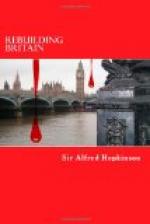mean land covered with timber trees, but a “certain
territory of woody grounds and fruitful pastures, privileged
for wild beasts and fowles of the forest to rest and
abide in,” in “the protection of the King
for his princely delight and pleasure.”
It was subject to special jurisdiction, and special
officers were appointed over it “to the end
that it may the better be preserved and kept for a
place of recreation and pastime meet for the royal
dignity of a prince.” The Forest Laws were
oppressive, and for the purpose of afforestation many
wrongs were committed. In the Crown forests, like
Epping Forest and the New Forest, there were a number
of commoners who had special rights of pasture and
of taking certain things from the forest, such as
firewood “that might do them good.”
It is by the assertion of such ancient rights of common
that Epping Forest has been preserved as a place of
recreation for the people of East London, and that
so much of the New Forest remains open land.
The latter is a source of perennial enjoyment to those
who visit it, and maintains the successors of the
old forest commoners in prosperity, due largely to
the fact that they can graze ponies there and feed
pigs on the acorns and beechmast. Whatever steps
are taken to promote the growth of timber—and
much has been done from time to time in the New Forest
with that object—it is important that these
valuable common rights should be preserved, and that
the value of open lands for the health and recreation
of the people should not be overlooked.
The need for systematic action and for the Government
to take steps to promote the growth of timber in the
United Kingdom has been pointed out from time to time.
The Board of Agriculture in 1911 drew up a memorandum
pointing out that “British forestry was far behind
that of other leading European States,” and
that “the growing of timber had never in this
country been recognised as a business”; that
“there had been no continuity of policy with
regard to it.” When the War broke out it
appears that only eight per cent, of the total amount
of timber required for home use was grown in the United
Kingdom, ninety-two per cent, had to be brought from
oversea. The War showed how perilous and how costly
a thing it is to neglect home production of necessaries.
When all our shipping was required for other purposes,
it was a most serious matter to take up tonnage with
a cargo so bulky as timber, occupying probably more
ship space in proportion to its value than any other.
More timber was required for huts and sheds, for railway
sleepers, and a variety of other purposes. For
the construction of aircraft special kinds of timber
were needed. The demand for pit props in enormous
quantities was urgent and continuous. At the same
time the loss of shipping through submarine action
became very serious. Fortunately our French Allies
had been more provident in conserving and promoting
their home supplies. Forestry in France had been




